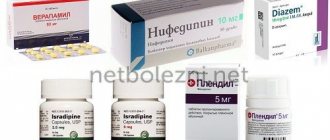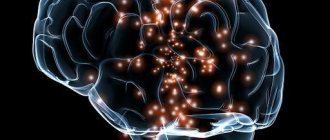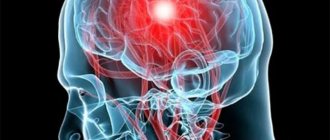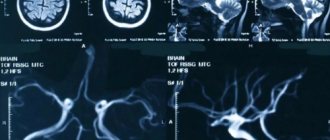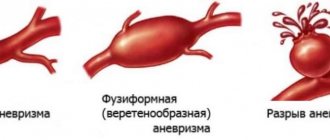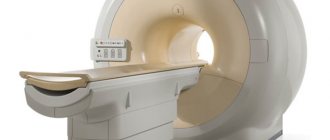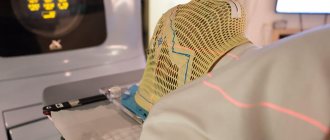Blood vessels are the most important component of the human body. They ensure continuous movement of blood from the heart to all tissues and internal organs. In order for blood to easily overcome numerous choroid plexuses, excess pressure is maintained in them. The condition of the blood vessels is of no small importance. Thanks to their three-layer internal structure, they are distinguished by elasticity, strength and chemical resistance. However, the normal functioning of the vascular system can be disrupted by poor environmental conditions, poor-quality products, and stress. As a result, various vascular diseases arise, which often lead to serious consequences.
Symptomatic picture of vascular diseases
Strong and healthy blood vessels are the key to smooth functioning of the heart. Proper contraction and expansion of the vessel walls ensures continuous transport of blood.
Loss of flexibility and blockage of blood vessels lead to oxygen starvation
If the vessels lose their original elasticity, become too dense or fragile, various pathologies form:
- vegetative-vascular dystonia;
- migraine;
- stroke, atherosclerosis;
- vascular aneurysms;
- ischemia;
- hypertension.
Problems with the vascular system can be recognized by the following signs:
- insomnia;
- frequent dizziness;
- numbness of the limbs;
- memory impairment;
- decreased mental activity;
- cyanosis;
- tachycardia and heart pain;
- dyspnea;
- depression;
- fainting.
When disturbances in the functioning of blood vessels appear due to osteochondrosis or spinal injury, the patient will complain of severe dizziness, migraines and constant weakness.
Frequent headaches can signal vascular diseases in the body
At the first symptoms indicating a malfunction in the body, you must immediately make an appointment with your doctor. He will order a full examination of the body, collect anamnesis and prescribe appropriate vascular medications.
Nootropics
This group includes the following medicines:
- Glycine,
- Piracetam,
- Pantogam,
- Phenotropil,
- Actovegin,
- Cerebrolysin.
Nootropics are powerful antioxidants; they increase resistance to oxygen starvation and the body’s resistance to harmful factors, improve cellular metabolism of the brain and cognitive activity, prevent depression and fatigue, and enhance mental performance.
Indications for taking nootropics include:
- mental retardation associated with vascular pathologies;
- memory impairment;
- asthenic syndromes;
- impaired mental function;
- vegetative-vascular dystonia;
- ischemic strokes;
- difficulty concentrating;
- alcoholic encephalopathy.
Piracetam from the group of nootropics improves not only blood circulation in the brain, but also the function of neurons
Nootropics should be taken only as prescribed by a doctor after a thorough examination. You should know that they only affect pathologically altered tissues and are not recommended for healthy people. Their use in preparation for exams, under heavy mental stress at work and for preventive purposes is in no way justified.
Mechanism of action of vascular drugs
On the walls of blood vessels there are muscle fibers shaped like rings. When muscles contract, the fibers also contract, and accordingly, the clearance decreases. When the muscles are relaxed, the walls of the blood vessels expand and the lumen increases. Vascular muscles can contract independently; in addition, they are in constant tone, thanks to continuous impulses that come from the central nervous system along nerve fibers.
The action of medications is aimed at restoring blood circulation, increasing the lumen of spasmed and damaged capillaries, cleansing and strengthening the walls of blood vessels. Blood flow to the neurons of the autonomic nervous system, sensitization of metabolic processes and elimination of oxygen starvation of brain cells help improve brain function, reduce or eliminate the symptomatic picture of the disease.
Antioxidants and antihypoxants
Such medications are always prescribed as part of complex therapy to improve cerebral vascular function. They quickly eliminate the symptoms of oxygen starvation and help strengthen vascular walls. Here is a list of the best medicines:
- Actovegin
(630 rubles). Activates tissue metabolism, eliminates hypoxia, optimizes trophism and recovery processes. The drug is obtained from the blood of animals, therefore, in addition to allergies, it has a small number of side effects. - Mexidol
(470 rubles). It is one of the best antihypoxants, membrane protectors, and nootropics. The medicine is administered intramuscularly or taken in tablet form. It increases the body's resistance to various damaging factors. With long-term use, the medicine somewhat thins the blood and reduces the accumulation of lipids, lowering cholesterol. - Emoxipin
(250 rubles). Antioxidant, stabilizer of cell membranes, reduces vascular permeability. Has a retinoprotective effect. Most often prescribed if cerebral disorders affect the condition of the retina. - Glycine
(40 rubles). This amino acid is a natural brain metabolite, a neurotransmitter, that helps regulate metabolism in brain tissue.
Complamin, Glutamic acid, Picamilon and other antihypoxic and antioxidant agents also improve the functioning of cerebral vessels.
Types of vascular devices
Drugs intended for blood vessels are classified into several categories. All of them have an individual range of purposes:
- Medicines that dilate blood vessels and improve blood circulation in the vessels of the brain;
- Agents that strengthen the vascular wall;
- Nootropics that restore blood circulation and memory;
- Anti-migraine medications that relieve spasm;
- Antiplatelet agents and anticoagulants that help thin the blood and prevent blood clots.
What medications are used
To normalize blood circulation in the brain, drugs of different groups are prescribed:
- vasodilators (vasodilators);
- medications that prevent blood clots (antiplatelet agents, anticoagulants);
- nootropic drugs that affect higher brain activity.
How they work:
- Dilate blood vessels.
- Reduce platelet sticking (aggregation).
- Reduce blood viscosity.
- Increase the plasticity of red blood cells.
As a result, blood flow increases, blood supply improves, brain cells are better provided with glucose and oxygen, and their resistance to hypoxia increases.
Drugs to normalize blood flow in the brain
Pharmacological agents designed specifically to improve blood flow in the brain are divided into 3 groups:
- Myotropic. The active elements of this group affect the smooth muscles of the walls of blood vessels, thereby reducing its tone. Myotropic drugs include Eufillin with Dibazol.
- Neurotropic. Medicines have a direct effect on the nerve endings of cells (Reserpine, Validol).
- Nitrates. This group includes the properties of the above-described products. This includes Nitroglycerin with Nitrosorbitol.
Eufillin is one of the most common drugs for the treatment of vascular diseases
The composition of the drug and its effect may also differ. Based on this, the following groups can be distinguished.
Calcium blockers
This type of medication contains active ingredients that affect the substance that causes impaired vascular flexibility. These include calcium ions, which strengthen the walls. Since the medications are intended to normalize cerebral circulation, they are not used to treat heart disease. There are three generations of calcium blockers. First generation drugs contain three main active ingredients:
- verapamil (Finoptin);
- nifedipine (Corlipin, Nifedipine);
- diltiazem (Diazem).
Nimodipine, Clentiazem, Tiapamil belong to the second generation. The improved third generation includes drugs such as Amlodipine, Norvasc.
Norvasc is a modern remedy characterized by fast action and long-lasting effect after treatment.
The main difference between third-generation drugs and their predecessors is their high prolonged action and low number of side effects.
Heart remedies
This category of drugs improves oxygen saturation of the brain and normalizes the functioning of coronary vessels. As a rule, these preparations are made from plants: lily of the valley, adonis. Pharmacological names of cardiac drugs are Cardiovalen, Adoniside.
Products containing nicotinic acid
Enduratin, Nicotinic acid.
Nicotinic acid helps lower blood cholesterol, thereby reducing the risk of plaque formation
Nicotinic acid acts even on small capillaries. Treatment of large vessels with this drug does not give positive results. When taking medications from this group, it should be taken into account that acid has a negative effect on the liver. It is necessary to strictly adhere to the dosage prescribed by the doctor.
Preparations made from plants
Medicines have virtually no contraindications or serious side effects. They are prescribed to improve blood flow in the brain and also eliminate spasms. Herbal preparations are classified into two categories:
- Ginkgo Biloba extract (Tanakan, Bilobil);
- with plant alkaloids (Vinpocetine, Cavinton).
Drugs intended to expand the lumen between the walls of blood vessels should absolutely not be taken without prior consultation with a doctor. An incorrectly selected dosage can lead to an increase in heart rate, which is fraught with serious consequences.
Nicotinic acid preparations
Nicotinic acid, or vitamin PP, dilates capillaries, but does not have a significant effect on large vessels. In some cases, drugs based on it are prescribed for cerebral circulation disorders. They reduce the fragility of the walls of blood vessels due to their ability to reduce the level of bad cholesterol. In case of impaired blood supply to the brain, Nikoshpan, Acipimox, Enduratin are prescribed.
Nicotinic acid improves capillary blood flow
Self-treatment with nicotinic acid can lead to serious consequences, so you should only undergo a course of therapy under the supervision of a doctor. Treatment consists of several courses of injections, then proceed to tablet forms.
Drugs to strengthen the vascular wall
An active lifestyle, a balanced diet and preventive measures will help strengthen the walls of blood vessels. In some cases, taking medications, which should be selected by the attending physician, has a positive effect.
- Ascorutin. It contains active ingredients: rutin with ascorbic acid. Using the product will help strengthen the walls of blood vessels. Ascorbic acid, involved in oxidative and reduction processes, will compensate for the lack of vitamin in the body, and rutin stimulates the absorption of acid by tissues and organs.
- Venoton, tincture and tablets. It contains garlic and buckwheat flower extract, lactose and ascorbic acid. Taking the drug helps strengthen the walls of blood vessels and reduces their permeability. Venoton is prescribed to people with venous insufficiency and swelling. Its use is also effective for convulsions, fatigue, and paresthesia.
- Antistax. This is a medicine for blood vessels, in which the active ingredient is red grape leaf extract. Antistax fights the permeability of the walls of blood vessels, increases their elasticity, reduces inflammation, and relieves swelling. The drug is usually prescribed for varicose veins, as well as for chronic venous insufficiency.
- Detralex. It is classified as an angioprotector and venotonic, thanks to diosmin, the active ingredient in the composition. The use of the drug reduces vascular permeability and increases hemodynamics. Detralex is used in the treatment of hemorrhoids.
Ascorutin is an excellent remedy for strengthening the walls of blood vessels
Traditional methods of treatment
Today, home medical treatment methods are not inferior to modern methods of treatment, so many people prefer to be treated and prevent dystonia on their own, using the gifts of nature. Herbalists suggest treating narrowed blood vessels in the brain with effective herbal infusions.
- You need to take a couple of particles, divided equally: burdock root, eleutherococcus fruits, mint and birch leaves, marsh cudweed, kidney tea. Pour half a liter of hot water over the entire mixture and leave for 30 minutes. For the best effect, you need to drink one hundred ml of liquid three times per 24 hours.
- Mix St. John's wort, chamomile, immortelle, birch buds and add a few glasses of hot water. We divide the collection in half and drink it twice every day with a small spoon of honey and bay leaf oil.
- We take clover, 5 parts of wormwood, a couple of pieces of myrtle, one piece of marjoram and half a share of parsley seeds. A liter of hot water is added to three large spoons of the product. Let the broth sit for a couple of hours, drink 1 fourth cup every few hours.
- Boil the mixture with pine needles, onion peels and rose hips, and let it sit. We drink half a liter a day for 3 months, dividing the portion into morning, lunch and evening.
- Take one large spoon with chopped burdock rhizome, fill it with half a liter of water and leave it in a thermos for infusion. We drink 100 ml in the morning for 3 months.
Before using traditional recipes, you should consult your doctor.
Homeopathy
The action of drugs from the homeopathic group is based on the transfer to the body of the beneficial properties of herbal medicines.
Homeopathic medicines do not have an immediate effect, but they have virtually no contraindications or side effects
Drugs are selected based on the individual characteristics of the patient and his diseases. As a rule, homeopathic remedies need to be taken for a long period. For atherosclerosis, drugs such as Cerebralic and Edas-138 have a beneficial effect. They help improve memory and brain activity.
Antiplatelet agents and anticoagulants
Anticoagulants are special pharmacological drugs that inhibit coagulation processes (clumping of blood cells). They treat diseases associated with thrombosis, such as stroke and heart attack. Natural anticoagulants include:
- Heparin;
- Dicumarol;
- Hirudin.
These medications help prevent vein thrombosis, prevent thromboembolism, and reduce the risk of heart attack. In addition, they treat peripheral vascular diseases. Their principle of action is based on the inhibition of vitamin K and activation of antithrombin III.
Antiplatelet agents are drugs that prevent blood cells from sticking together, thereby preventing the formation of blood clots.
Antiplatelet drugs are prescribed to people who are at risk of developing blood clots
This category of medicines includes:
- vitamin E;
- products containing the Ginkgo Biloba plant (Bilobil, Ginos);
- Aspirin, Aspirin Cardio, Acecardol are drugs with acetylsalicylic acid as an active ingredient.
Antiplatelet agents are found in large quantities in ginger, pomegranates, onions, papaya, ginseng, soy, and fish oil. However, these vegetables and fruits should be consumed under the supervision of a specialist.
Drugs for cervical osteochondrosis
Osteochondrosis is a disease accompanied by pain in the spine that interferes with everyday activities. The use of non-steroidal anti-inflammatory drugs for osteochondrosis helps alleviate the health condition: they eliminate the inflammatory process in the tissues of the spine, thereby relieving pain. But not all anti-inflammatory drugs are equally effective and safe for the body.
- Diclofenac
. Included in the anti-inflammatory drugs Voltaren, Ortofen, Diclak, Flotak, Diclobene. The analgesic and anti-inflammatory effects are equally well expressed. It inhibits both forms of the COX enzyme, but to a greater extent COX-2, so drugs with Diclofenac are less likely to cause gastrointestinal lesions than other first-generation NSAIDs. - Ibuprofen
. Preparations with ibuprofen (Dolgit, Nurofen, Ibalgin, Solpaflex) have a pronounced analgesic effect, the anti-inflammatory effect is somewhat weaker. Clinical studies have shown that the incidence of adverse reactions after taking therapeutic doses is the lowest among all non-selective NSAIDs. - Indomethacin
. One of the oldest representatives of the group of non-steroidal drugs. It has proven itself as a powerful analgesic and anti-inflammatory agent for osteochondrosis and other rheumatic diseases. But taking this drug is unsafe in terms of the development of serious complications of the gastrointestinal tract, central nervous system, heart failure and has many contraindications. It is used only occasionally for unbearable pain.
Drugs that cleanse blood vessels
Poor diet, smoking and alcohol abuse, polluted environment - all this negatively affects the walls of blood vessels, on which toxins and waste products form over time. Clogging of the internal walls often leads to various disturbances in the functioning of the circulatory system, increased cholesterol levels, and pathologies of the cardiovascular system. To restore blood vessels, it is necessary to take drugs that cleanse them.
Tablets that strengthen and cleanse veins, arteries and smaller vessels can be classified into several groups:
- Vitamins A, B, E, P, C;
- Cavinton and Dihydroquerticin are medications designed to strengthen the walls of blood vessels and restore their elasticity;
- Cinnarizine is a drug from the category of calcium channel blockers;
- Cardiomagnyl is the best blood thinner;
- Corbalance, Capillarin - cleanse vascular walls of cholesterol plaques;
- Dietary supplements, among which the most effective are drugs such as Antiox, Vinex.
Tablets from the list are taken only according to indications, after a thorough examination of the condition of the blood vessels.
Drug treatment for stroke
A stroke is an acute circulatory disorder in the brain that requires quick help and further long-term treatment. Correctly selected drugs will help save the patient’s life and increase the chances of restoring lost functions (speech, motor).
In an ischemic stroke, part of the brain is deprived of blood supply due to a blood clot formed in a vessel. The following drugs are indicated for patients with this disease:
- At the first signs of acute stroke, antiplatelet drugs are prescribed. The most famous of them is aspirin. In case of intolerance, replace it with Ticlopedine, Dipyridamole.
- To prevent the formation of blood clots and blockage of blood vessels, low-molecular-weight heparins, for example Clexane, are indicated.
- After heparins, treatment with indirect anticoagulants (Sincumar, Warfarin) is continued.
- To increase blood volume and improve its flow to the brain, molecular dextrans (Reopoliglucin) are indicated.
- For high blood pressure, calcium channel blockers and ACE inhibitors are prescribed to prevent recurrent stroke.
- To improve microcirculation, Trental and Curantil are used. For vasodilation - Vinpocetine.
- During the recovery period, nootropic drugs are indicated.
Hemorrhagic stroke is caused by a ruptured blood vessel in the brain and requires different treatment. Often it is necessary to resort to surgical intervention. Drugs prescribed include dextrans to replenish blood volume and medications to lower blood pressure.
Angiovitis
The first domestic drug created for the correction and treatment of hyperhomocysteinemia. Contains specially selected therapeutic doses of vitamins B6, B12 and folic acid (vitamin B9). It has angioprotective properties, promotes structural and functional normalization of the inner wall (endothelium) of blood vessels.
ANGIOVIT® was developed by the pharmaceutical industry together with a group of leading Russian scientists under the leadership of Corresponding Member of the Russian Academy of Medical Sciences, Doctor of Medical Sciences, Professor Z.S. Barkagan.
ANGIOVIT® is available in tablets coated with a protective coating. The main active ingredients of the drug are:
- vitamin B9 (folic acid) – 5 mg
- vitamin B6 (pyridoxine hydrochloride) – 4 mg
- vitamin B12 (cyanocobalamin) – 0.006 mg
ANGIOVIT® has undergone preclinical and clinical testing and is recommended for use in therapy, cardiology, obstetrics and gynecology.
Which is better: injection or tablets?
Injections are more effective than tablets, since the liquid medicine goes directly into the blood after injection. However, this method of treatment is not always acceptable, especially if the patient is treated at home. In this case, it is more convenient to take tablets. As for therapy in a hospital setting, it involves treatment through intravenous and intramuscular injections.
Injections are much more effective than tablets, but their use is not always convenient at home
Vascular agents that are most often used in injection treatment:
- Vinpocetine, Cavinton are alkaloid derivatives. They are prescribed to normalize the nutrition of nerve cells and restore blood flow.
- Eufillin - dilates vascular walls, saturates the brain with oxygen.
- Drotaverine (No-shpa). As a rule, this medicine is used in tablet form, but if indicated, treatment with injections is possible.
- Piracetam. Quickly relieves vascular spasm. Available in ampoules and tablets.
- Nicospan and Nicotinic acid. Medicines are sold in ampoules and tablets. They are taken to lower cholesterol levels. Typically, drugs in this category are prescribed in combination with other drugs.
Vascular disorders and diseases make up the vast majority of brain pathologies in people of all ages. Therefore, at the first symptoms indicating a disease, you must immediately consult a doctor for examination and diagnosis.
Calcium channel blockers
These medications are among the most popular among neurologists and therapists. Due to a decrease in the amount of calcium in cell membranes, the vascular walls relax, their lumen expands, and blood flow increases. The amount of nutrients and oxygen reaching the brain also increases. The tone of the veins does not change, which is important for maintaining normal venous outflow. There are a number of proven drugs, as well as new generation drugs.
Which ones are better to choose? The list of the most popular is given in the table.
| Generation | Name of medicine | Group |
| First | Verapamil | Phenylalkylamine derivatives |
| First | Nifedipine | Dihydropyridine derivatives |
| First | Diazem | Benzothiazepine derivatives |
| Second | Isradipin | Benzofurazanil derivatives |
| Second | Plendil | Dihydropyridine derivatives |
Currently, third-generation drugs are being developed that have even fewer side effects and contraindications. The above remedies can also treat arterial hypertension. Vasodilators are contraindicated during pregnancy and lactation.
